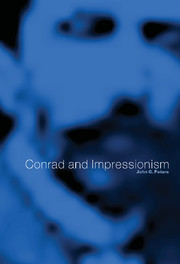Book contents
- Frontmatter
- Contents
- Preface
- Acknowledgments
- List of abbreviations
- Introduction. Objects of consciousness in Conrad's impressionist world
- 1 Subject/object: science and the epistemological origins of literary impressionism
- 2 Objects and events in the “primitive eye”: the epistemology of objectivity
- 3 Other-like-self and other-unlike-self: the epistemology of subjectivity
- 4 “Sudden holes” in time: the epistemology of temporality
- 5 Radical relativism, epistemological certainty, and ethical absolutes: Conrad's impressionist response to solipsism and anarchy
- Epilogue
- Notes
- Selected bibliography
- Index
5 - Radical relativism, epistemological certainty, and ethical absolutes: Conrad's impressionist response to solipsism and anarchy
Published online by Cambridge University Press: 22 September 2009
- Frontmatter
- Contents
- Preface
- Acknowledgments
- List of abbreviations
- Introduction. Objects of consciousness in Conrad's impressionist world
- 1 Subject/object: science and the epistemological origins of literary impressionism
- 2 Objects and events in the “primitive eye”: the epistemology of objectivity
- 3 Other-like-self and other-unlike-self: the epistemology of subjectivity
- 4 “Sudden holes” in time: the epistemology of temporality
- 5 Radical relativism, epistemological certainty, and ethical absolutes: Conrad's impressionist response to solipsism and anarchy
- Epilogue
- Notes
- Selected bibliography
- Index
Summary
“And without you I would think myself alone in an empty universe.”
“Letter to Edward Garnett”As I have shown, throughout his works, Conrad investigates a variety of objects of consciousness: physical objects, human subjects, events, ideas, space, and time. With each object of consciousness, he employs impressionist techniques to show that the epistemological process is individual, and his impressionism consistently leads to human subjectivity as the common element in the appearance of these objects. This common element demonstrates a kind of unity in Conrad's works that may not initially be apparent. Not only is the epistemological experience individual, but it also forms the building block for knowledge of the nature of human existence and the external world, and since objects of consciousness are individual, knowledge is individual as well. Furthermore, the individual nature of the epistemological process also points to questions concerning western civilization of that time, and these questions lead to an uncertainty about what human beings can know.
Conrad specifically emphasizes the uncertainty of knowledge in several instances. The clearest demonstration of this fact occurs when Jim claims that Marlow cannot know what he would have done had he been in Jim's place on the Patna: “You can't tell – nobody can tell” (LJ 92). The uniqueness of the context (physical circumstances and human subjectivity) makes it impossible for others to know how they would respond to a given situation.
- Type
- Chapter
- Information
- Conrad and Impressionism , pp. 123 - 158Publisher: Cambridge University PressPrint publication year: 2001



